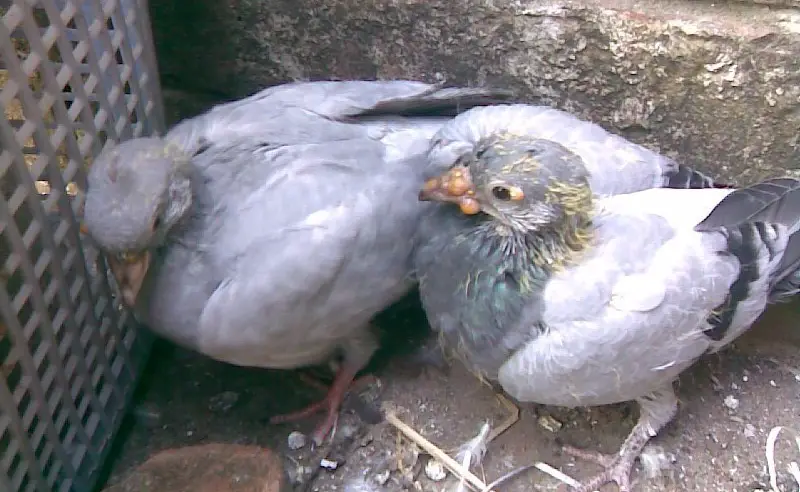Pox virus is not usually serious and occurs in pigeon flocks and feral pigeons worldwide.Increased incidence of pigeon pox is observed in humid summer and warm winter weather.
How the pigeon pox virus spreads
Pox is spread by insects and through fighting. The usual mode of transmission is fighting,when the beak of an infected bird simultaneously breaks the skin and leaves a small amountof saliva containing the virus behind. For birds to become infected, the virus needs a breakin the skin or mucous membrane lining the mouth or eyelid to gain entry. For this reasonmost lesions are around the eyes and beak, and cocks are more frequently infected.
Additionally, birds with the disease excrete the virus in tears, saliva and sometimes theirdroppings. At certain times the virus is also found in the blood.
Mosquitoes and other blood-sucking insects can also transmit the disease but can usuallyonly gain access to the un-feathered parts of the body and so cause lesions around the headand on the legs.
Mites can also spread the virus and can also cause lesions to develop on the feathered partsof the body. When non-infected and infected birds share drinkers or bath water, the virus canbe transmitted through the water. When sharing bath water, the virus can infect the featherfollicle at the time the feather is emerging, and cause vesicles to form here.
Symptoms
- Birds may show scabby or crusty lesions on unfeathered parts of the body such asthe beak, around eyes and on the feet.
- In the beak or throat cavity there may be cheesy-looking, foul smelling ‘growths'(known as the mucousal form). These can be confused with canker growths for theinexperienced, particularly if no outer skin lesions are seen, so a veterinary diagnosisshould be obtained.
- Birds may appear otherwise well, unless lesions in the mouth interfere with feeding orbreathing.
Treatment
- There is no antiviral treatment as such, but a vet may prescribe an antibiotic tocombat any secondary infections.
- Vitamin A can help to promote healing of skin lesions.
- Do not attempt to remove lesions inside the mouth – they are actually outgrowths ofthe skin – as this is likely to cause severe bleeding.
Prevention
- Pigeons may be vaccinated against pox – Pox vaccination is possible from as earlyas six weeks old.
- Treat any cuts and abrasions seen on a bird.
- In climates prone to mosquitoes, take necessary precautions to prohibit them fromentering the loft such as through the use of screens.
Frequently asked questions
Is pigeon pox contagious to humans?
No, there is no evidence to suggest that pigeon pox can infect humans.
How long does pigeon pox last?
Pox disease lasts for around 3-4 weeks, or even several weeks or months in undernourished pigeons.

